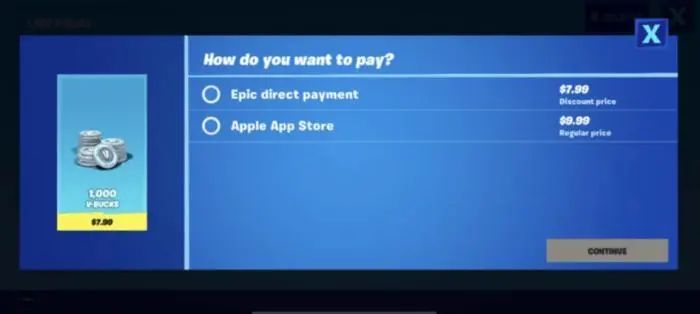Whose pocket did the money you paid for the game end up in?
"We are like Apple in 1984, ‘when Apple had the revolutionary power to break IBM’s monopoly on the computing technology market.’ But now, ‘Apple is the behemoth it once accused of trying to control markets, stifle competition and stifle innovation.’"
The new payment system undoubtedly violated Apple’s App Store policies, and Apple responded quickly and aggressively by removing Fortnite entirely from the App Store. Epic was clearly well-prepared. Shortly after being taken down, Epic released a small video of "Fortnite", in which it mocked Apple from a former dragon slayer to a dragon, borrowing a meme from Apple’s famous 1984 MAC ad.
The classic 1984 Apple ad was about revolution and breaking IBM’s monopoly. But the video was more than a satire. Minutes after the video was released, Epic announced that it had filed a lawsuit against Apple.
The rivalry between the two sides is still escalating. Apple has taken down Epic’s developer account and iOS and MAC power builder. Epic claims this will prevent them from developing software for Apple’s platform, including Unreal Engine support for third-party developers on the iOS.

However, according to an annual survey called "All Things Valve Should Know 3.0": Since 2018, game developers, especially in the West, have become increasingly negative about Valve and Steam, and have begun to lose confidence in Steam. They do not believe that it is reasonable to pay 30% of the platform’s commission to the store.
Epic became the initiator of this battle for platform royalties. Previously, with the popularity of its games such as Fortnite, Epic established its own game platform, Epic Games Store, packaged all its games, and used ultra-low royalties as a means to attract game developers. From previous news, Epic did not intend to treat Steam as a competitor, but more to convey that it wanted to change the 30% cut of computer games (PC) platforms. From the original game developer Deep Silver’s announcement that "Metro 2033" would be exclusive to Epic for a limited time for one year, to the later announcement of a limited time exclusive to the Epic platform by popular game developers, and then to Ubisoft’s removal of "The Division Blockade 2" directly from Steam, game makers and platforms are using actions to demonstrate their views on the cut.

Is 30% reasonable?
The 30% platform commission is a traditional system, originally formulated by first-party console manufacturers such as Nintendo, Sony, and Microsoft. The financial resources of Nintendo, Sony, and Microsoft to operate platforms are unmatched by PC platform operations. They have also shown players that operating a PC-side platform, even a 12% commission, is also very profitable. Since the operation of the host platform and the operation of the PC platform are completely different from the difficulty level, it is indeed unreasonable for Steam to operate according to the platform commission of the host manufacturer.
Some netizens broke the relevant commission data of Tencent’s platform: if you just log in to Tencent’s platform, there will be a 30% commission; if you want to promote and use the server, the commission will increase to 50%~ 60%; if it is a mobile game, the commission will be 70%. In addition, the application treasure is 70%; the WeChat mini-game props internal purchase is 40%; the part of the single-day advertising revenue within 100,000 yuan, the developer can get 50% of it; the part of the single-day advertising revenue exceeding 100,000 yuan, the developer can get 30% of it. From this point of view, is the 30% commission not high?
In fact, this is not the case. In China, Tencent owns the vast majority of traffic, and even with a 70% cut, game developers or publishers earn more than many other platforms that take a 10% cut. The main reason why it is unreasonable to say that Steam’s 30% cut is that even in an ideal situation, the income of most profitable game companies is equivalent to the income of the platform, and even the income of the platform is higher than that of the game company. And online game platforms such as Steam,Neither do they have to bear the high costs associated with physical stores and logistics, nor do they have the obligation to help game companies promote their games, which has caused many game makers to be dissatisfied with the 30% cut in recent years.
For an indie game studio, such a high cut would pose a dilemma for the entire team.If the game is handed over to a large company for distribution, and the large company cooperates with Steam, it is equivalent to being drawn twice. And if the independent game team wants to log in to Steam by itself, it will encounter more resistance. On the one hand, Steam will not provide these studios with upfront funding, and it is difficult for an independent development team to complete the game independently without the help of the operating company. On the other hand, the promotion and marketing of the game is very important, and most independent studios do not have the ability to do the follow-up work themselves. In addition, for low-cost indie games, publishing on a high-traffic platform like Steam represents more opportunities, and the advantages outweigh the disadvantages than the high commission.
The fantasy video game website (IGN) has sorted out the sales data of major online sales platforms from dozens of information sources. Surprisingly, the data provided by the vast majority of sources is exactly the same, that is, 30% of the platform. Not only Steam and Apple, but also online sales platforms such as Microsoft, Sony, Google, Nintendo, and offline sales platforms such as Amazon and Walmart draw 30%.It can be seen that a 30% cut is a common practice in the industry and a major environment in the game business community.
In the eyes of most game developers, Epic played the role of a revolutionary pioneer, a "leading brother" who explicitly proposed that the 30% cut was unreasonable. However, in the eyes of players, this was not the case. Negative comments on Epic were widely circulated among players. In the eyes of many players, Epic was a speculator, doing things to occupy the market under the name of lowering the platform’s cut.
This phenomenon is very easy to understand, because the level of the platform does not affect the price of the game too much, players can not feel the intuitive benefits, and Epic as a latecomer, the player group is far less than the predecessor Steam, in the platform function and user experience are not as good as Steam, most Steam users are not surprising to Epic.
But there are still reasons to believe that Epic is determined to change the platform’s commission. A 12% commission will undoubtedly attract more and more games to the Epic platform, and Epic expands its player base through a large number of free games and benefits. The substantial benefits that low commissions bring to game developers will gradually emerge, and more outstanding studios in trouble can show their talents on the Epic platform.
In the new game market system, a model full of reform and innovation may be vacated, and Epic has become the person who raises the revolutionary banner, but whether it can become the ultimate winner remains to be seen.
(Li Meng is a master’s tutor at the School of Animation and Digital Art, Communication University of China; He Yucheng is a graduate student at the School of Animation and Digital Art, Communication University of China)